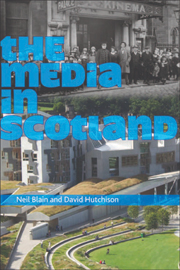Book contents
- Frontmatter
- Contents
- Preface
- Framing the Discussion
- The Historical Context
- Screen and Sound
- Themes and Futures
- 12 Gender, Spaces, Changes: Emergent Identities in a Scotland in Transition
- 13 Race and Ethnicity in the Media
- 14 Gaelic, the Media and Scotland
- 15 The Scottish Media and Politics
- 16 A View from Westminster
- 17 A View from Holyrood
- 18 Media Sport
- Select Bibliography
- Notes on Contributors
- Index
16 - A View from Westminster
from Themes and Futures
Published online by Cambridge University Press: 05 August 2013
- Frontmatter
- Contents
- Preface
- Framing the Discussion
- The Historical Context
- Screen and Sound
- Themes and Futures
- 12 Gender, Spaces, Changes: Emergent Identities in a Scotland in Transition
- 13 Race and Ethnicity in the Media
- 14 Gaelic, the Media and Scotland
- 15 The Scottish Media and Politics
- 16 A View from Westminster
- 17 A View from Holyrood
- 18 Media Sport
- Select Bibliography
- Notes on Contributors
- Index
Summary
Parliamentary reporting, in the straightforward form of placing on record what was said in the House of Commons, is an honourable form of journalism that is now close to extinction.
Unless one dips into the columns of Hansard, it is very unusual to read an unvarnished summary of Parliamentary proceedings in which the views expressed by ministers and MPs are allocated a few succinct lines and the occasional ringing phrase or significant sentiment is placed on record.
Nobody, we are told, wants to read it, and this may be true. However, the demise of Parliamentary reporting contributes to one of the great contradictions of modern politics: while the media purport to despise ‘spin’ as a substitute for some purer flow of information, they have themselves opted to cover Parliament and politics in terms that are overwhelmingly ‘spun’ rather than merely reported.
Whatever the cynics might wish us to believe, issues of substance which affect the lives of every citizen in the United Kingdom are raised and discussed at Westminster on every day that Parliament sits. The vast majority of these matters go unreported. In Scotland, that reality is compounded by the desire in some quarters to minimise the significance of Westminster in comparison to the Scottish Parliament at Holyrood.
Devolution has undoubtedly removed many of the distinctively Scottish elements from the Westminster mix. There are now very rarely debates on uniquely Scottish legislation in the chamber. There are therefore no standing committees on Scottish business. Scottish Questions is usually a perfunctory occasion. The Scottish Grand Committee scarcely lives up to its name while the Scottish Select Committee struggles to find subjects within its remit to investigate.
- Type
- Chapter
- Information
- The Media in Scotland , pp. 243 - 247Publisher: Edinburgh University PressPrint publication year: 2008



